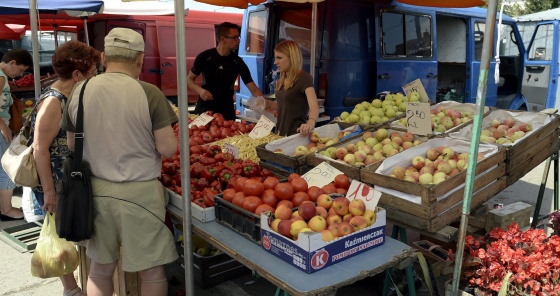
As fruits and vegetables at the market Przemysl (Poland). / EFE
goes to Brussels action. The European Commission has announced a package of measures to support the agricultural sector valued at 125 million euros in order to “stabilize” prices to compensate for the early effects of the Russian ban on imports on Monday. The EU measures include withdrawals of products already on the market-and will go to benéfica- distribution and compensation not collect or harvest before ripening. The financial assistance will go to those full-season crops and in which, therefore, storage is not a valid option to stabilize the market. The products that will benefit from the measure, which adds to the aid already approved for nectarinas- be peaches and tomatoes, carrots, cabbage, bell pepper, cauliflower, cucumber and gherkin, the mushroom and other mushrooms, apple, pear, red fruit, table grapes and kiwi.
The EU executive stressed that all-whether or not partners-farmers will benefit from aid to come into effect this Monday and will have a term of three and a half months. Brussels justify this action, which comes four days after the United detailing the individual impact and try to balance supply and demand to avoid a collapse in prices, the inability to open an alternative market for these products “immediately”.
A community spokesman has clarified that the withdrawal of market production is implemented through agricultural organizations and the EU will cover 100% of costs if the product is distributed freely with social or charitable purposes ( hospitals, schools and food banks) and 50% if used in the production of compost, in power generation, or if not collected or destroyed. In the latter case, agricultural organizations will be responsible for the other half of the losses.
Among the products that will benefit from the aid, the kiwi (10% of total production is exported to Russia) is, a priori, the most impacted by the sanctions imposed by Moscow in early August. Pear (8%) and apple (7%) also stand out above the rest. On the opposite side, cauliflower and carrots (1% in both cases) are, according to EU data, yields less affected.
In a statement, the European Commission has indicated that it will continue its monitoring of the markets affected by the Russian veto “direct contact” with national authorities and states that “not hesitate” to support other sectors that depend “heavily” on exports to Russia. Representatives of Community Department of Agriculture will meet again this Friday with envoys of the Member States, in a meeting that will be attended by experts from the European Parliament. By next September 5 is provided an extraordinary summit of trade ministers to address the situation.
Until Monday, the EU executive had merely expressed its support to the producers concerned and had only acted on two markets: peaches and nectarines. It is recalled that the European Commission quantifies the impact of Russian sanctions on EU 5.252 million euros and has a reserve of only 420 million in 2014 to just over 430 million in 2015 to deal with compensation. The release announced Monday comes from this game.
Meanwhile, the Spanish Minister of Agriculture, Isabel García Tejerina, said this afternoon that it is still “too early” to know whether “sufficient spare or miss “with 125 million announced by Brussels and stressed that,” if necessary “, the Spanish government asked the European Commission’s resources” that no sector will be affected “by the selective embargo imposed by Russia. According to García Tejerina, the EU executive “being finalized” for details on the implementation of measures so far “has just outlined.”
After meeting with the minister, the heads of the main Spanish agricultural organizations have left glimpse of his “doubts” about European aid and demanded greater speed of action of the institutions with lower prices which are beginning to be seen in several niche markets.
Sanctions Kremlin weigh on all the-meat, fish, dairy, fruits and vegetables-perishable food produced in the EU, USA, Canada, Australia and Norway. According to recent data from the European Commission, Spain would be the sixth most affected EU (338 million) country, behind Lithuania (927 million), Poland (841), Germany (595), Netherlands (528) and Denmark (377).
No comments:
Post a Comment